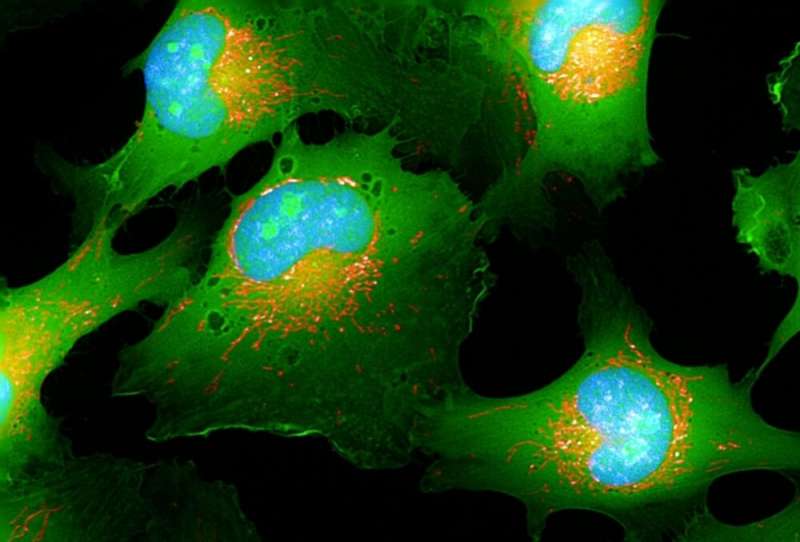Study links genetic variant to digestive disturbances in patients with Chagas disease


Chagas disease, caused by the protozoan parasite Trypanosoma cruzi, affects some 8 million people worldwide. More than a third develop severe heart or digestive problems with a heightened risk of death. The process that leads to this clinical condition is not completely understood.
An article published in the journal Biomedicines describes a study led by Brazilian researchers showing that mutations occurred in the mitochondrial genes of patients with Chagas disease megaesophagus, a disorder in which the esophagus dilates and loses motility. The discovery could pave the way to the development of novel treatments.
The study suggests that increased production of the cytokine interferon-gamma, an inflammatory mediator, in people with these mutations causes oxidative stress, leading to mitochondrial dysfunction in neurons. Degeneration of neurons in the lining of the esophagus contributes to development of the disorder.
“After years of research, we were able to achieve a better understanding of the mitochondrial dysfunction induced by interferon-gamma. The importance of this finding is the chance it offers to search for specific drugs that can mitigate the alteration,” Edecio Cunha-Neto, last author of the article, told Agência FAPESP.
An immunologist and a researcher at the Heart Institute (INCOR) run by the University of São Paulo’s Medical School (FM-USP), where he is a professor in the Department of Clinical Medicine, Cunha-Neto is one of the corresponding authors of the article. The other is Christophe Chevillard, a researcher at Aix-Marseille University in France.
Cunha-Neto has studied Chagas disease for more than 30 years and is particularly interested in cases of cardiomyopathy caused by the disease. These patients were previously shown to have an inflammatory alteration, measured in terms of blood levels of interferon-gamma, he explained.
In the study, the researchers analyzed material from the hearts of Chagas patients submitted to heart transplants and observed a disturbance in the organ’s energy metabolism, with reduced levels of a large number of proteins and enzymes linked to the production of ATP (adenosine triphosphate), the main source of cellular energy and a participant in the making of RNA. These results corroborated previous in vivo observations of a lowered energy metabolism in the hearts of Chagas patients.
In a 2021 Frontiers in Immunology study, for example, high levels of interferon-gamma in patients with cardiomyopathy due to Chagas were found to lower the cellular energy metabolism, leading to mitochondrial dysfunction in cardiac tissue.
Mitochondria are organelles that supply energy to cells. They have their own genome—mitochondrial DNA or mtDNA—with 16,569 nucleotides subject to mutations. About 1,500 mitochondrial genes are encoded in cell nuclei. Some mutations can lead to the development of mitochondrial disease.
“We treated cardiomyocytes with interferon-gamma and observed a decrease in ATP production, which led us to assume that interferon-gamma was also involved in other symptoms of the disease, reducing mitochondrial function. We decided to study cases of megaesophagus,” Cunha-Neto said.
About 10% of all Chagas patients have digestive alterations, and 30% have heart problems, according to estimates. About 60% of the latter die within two years, compared with 30% for subjects with other kinds of cardiomyopathy. In October, the Brazilian Society of Cardiology (SBC) issued new guidelines on Chagas cardiomyopathy, including new treatment recommendations.
The World Health Organization (WHO) classifies Chagas as a neglected tropical disease (NTD). It is spread mainly by infected triatomine or kissing bugs, which defecate after biting the victim. T. cruzi parasites in the feces can enter the body through mucous membranes or breaks in the skin.
Other vectors are increasingly important in several countries including Brazil, such as eating food contaminated by infected bugs, transmission of the parasite from mother to fetus during pregnancy, blood transfusions and organ transplants. The earlier the diagnosis, the sooner the patient can be treated with better chances of a cure.
Genetic analysis
By sequencing the exome (the genome’s protein-coding regions), the researchers had previously observed an association between rare mitochondrial genetic variants and chronic Chagas cardiomyopathy in families with multiple cases of Chagas.
In the recently published study, the group sequenced the whole exome of 13 patients with Chagas megaesophagus. About 40% had the same mitochondrial variant (MRPS18B P230A), which is found in 18% of patients with chronic Chagas cardiomyopathy but only in 2% of the total population of Brazil.
Patient lymphoblastoid cell lines with and without the mutation were analyzed to assess the effect of interferon-gamma on mitochondrial function. One patient was homozygous for the mitochondrial mutation and showed lower ATP production in the presence of interferon-gamma than cells from patients without the mutation.
The group recently had a new research line approved to analyze cases of families with mitochondrial mutations. The idea is to investigate the effects of treating models with interferon-gamma signaling inhibitors and substances that protect mitochondria. The substances that could be used include metformin, a drug used to control type 2 diabetes, and resveratrol, a plant-derived compound with antioxidant effects. Both have been shown to mitigate mitochondrial dysfunction induced by interferon-gamma in cardiomyocytes.
“We plan to screen 1,700 drugs already administered to patients and known to be safe to see if we can find others that have this mitigating effect on the action of interferon-gamma on cardiomyocytes,” Cunha-Neto said.
More information:
Karla Deysiree Alcântara Silva et al, Chagas Disease Megaesophagus Patients Carrying Variant MRPS18B P260A Display Nitro-Oxidative Stress and Mitochondrial Dysfunction in Response to IFN-γ Stimulus, Biomedicines (2022). DOI: 10.3390/biomedicines10092215
Priscila Camillo Teixeira et al, Impairment of Multiple Mitochondrial Energy Metabolism Pathways in the Heart of Chagas Disease Cardiomyopathy Patients, Frontiers in Immunology (2021). DOI: 10.3389/fimmu.2021.755782
Journal information:
Frontiers in Immunology
Source: Read Full Article